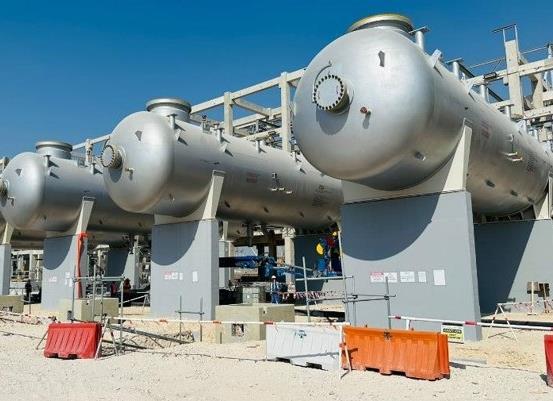This story requires a subscription
This includes a single user license.
Technip Energies reported a 13 percent year-on-year growth in its revenue to 4.97 billion euros ($5.38 billion) for the first nine months of this year.
The growth was primarily driven by the ramping up of LNG projects in Qatar.
In May last year, Technip Energies and Consolidated Contractors Company won the NFS LNG contract from QatarEnergy worth about $10 billion to build two mega LNG trains with a capacity of 8 mtpa each.
The company and Chiyoda previously won the EPC award for QatarEnergy’s North Field East project which includes building four trains with a capacity of 8 mtpa in the Ras Laffan complex.
Pieton said during the company’s earnings call on October 31 that both LNG projects, NFE and NFS, “are progressing per plan.”
“Notably, NFE has progressed towards peak mobilization with close to 45,000 workers at site. This activity will plateau at this high level through 2025,” he said.
LNG demand
Asked about the LNG market and the volume of unsanctioned projects, Pieton said, “our 2030 view for the LNG market is that the world will need 800 million tons per annum or so of LNG supply by 2030.”
“As you probably know, there’s about 500 million tons currently being produced. That’s the existing capacity. You have a further 200 MTPA under construction, and we are building a very large chunk of that, about 40 percent of that is under construction with Technip Energies,” he said.
“And therefore, it’s leaving a gap of about 100 million tons per annum that is needed to bridge from the current 200 million tons under construction,” Pieton said.
He noted that the LNG market is “supply-led and not so much demand-led.”
“So, you may see an excess of LNG around 2027, 2028,” he said.
He said this could drive some of the LNG prices or costs down and, therefore, attract more customers and more demand.
“And if you look back at the previous cycle, they have very similar attributes, in a sense that you have excess supply, which attracts more demand. And therefore, the supply-to-demand gap is being filled,” he said.
This triggers another wave of investment for more supply.
“I think we are in a third or fourth cycle of this kind. Therefore, based on what our customers say and what we hear from them, there’s no anxiety on our side. We’re quite optimistic about the LNG pipeline,” he said.
“We have quite a few prospects and FEEDs that are ongoing,” he said.
Lake Charles LNG, Rovuma
Pieton noted that a joint venture of Technip Energies and US-based KBR has recently secured an engineering, procurement, fabrication, and construction (EPFC) contract by Energy Transfer’s Lake Charles LNG.
Following a final investment decision, the Lake Charles LNG contract would be worth from $4 billion to $5 billion, according to Pieton.
Also, Technip Energies and Japan’s JGC have been awarded the front-end engineering design (FEED) contract by US energy giant ExxonMobil for the Rovuma LNG project in Mozambique.
“I mean, the pipeline continues to be rich in LNG for us going forward. So, no anxiety. And I would say a lot of optimism from my end, because I think the future is about renewable and gas, natural gas, and therefore LNG as part of natural gas,” Pieton said.
US election
Pieton also touched upon the upcoming US presidential election.
The Biden administration and the DOE announced in January this year that the DOE will pause review and approval of all new and pending applications for export authorization to non-FTA countries while DOE updates its assessment process.
Pieton said that, besides Lake Charles LNG, “we are still in the race with another developer in the US.”
“Obviously, if Trump wins the election, we can expect that the moratorium on LNG will be lifted maybe faster than if the current administration wins,” he said.
“Now, the current administration winning doesn’t mean that the LNG moratorium won’t
be lifted. Some are of the opinion that it will take a bit longer, but it will be lifted nonetheless,” Pieton said.
“But if it was to be a Trump victory, I believe we will see a faster lift of the moratorium, and therefore it will unlock a pipeline of opportunities. And we don’t need 10 of them. For us, one or two is plenty in the US,” he said.
Coral North FLNG
Pieton previously said there is a “high possibility” Italy’s Eni would take a final investment decision on its second floating LNG production project in Mozambique in 2024.
Back in November 2022, the 3.4 mtpa Coral Sul (Coral South) FLNG in Mozambique shipped its first cargo of LNG, adding Mozambique to the LNG producing countries.
The TJS consortium, consisting of Technip Energies, JGC, and Samsung Heavy, built the unit for Eni, the first floating LNG facility ever to be deployed in the deep waters of the African continent.
Eni discovered Coral back in May 2012 and it operates the Area 4 along its partners ExxonMobil, CNPC, GALP, Kogas, as well as ENH.
The partners are now working on the second FLNG project offshore Mozambique, called Coral Norte (Coral North), and the project would be a replica of Coral South.
Asked about the second FLNG project during the call, he said Coral Norte is “very much a question for ENI, but if it’s on this side of the 31st of December, or just on the other side, it won’t change much for us.”
“At the end of the day, it will be a project, and we’ll be happy to enjoy it. So that’s why we’re not totally a quarterly business. We nonetheless expect a very strong inbound in the fourth quarter,” he said.

